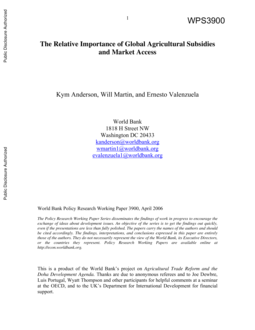Hello! You're looking at a policy document report on Overton
We track government policy, guidelines, think tank research, working papers and more to help our customers see the impact and influence of their work. Are you interested in seeing what information we have to offer? Request a free trial to our platform.
If you fund, produce or manage research or work to influence policy, we'd love to talk. Learn more on our homepage.

Identifiers
handle
10986/8700
The Relative Importance of Global Agricultural Subsidies and Market Access
Anderson, Kym, Martin, Will and Valenzuela, Ernesto
The claim by global trade modelers that the potential contribution to global economic welfare of removing agricultural subsidies is less than one-tenth of that from removing agricultural tariffs puzzles many observers. To help explain that result, the authors first compare the OECD and model-based estimates of the extent of the producer distortions (leaving aside consumer distortions), and show that 75 percent of total support is provided by market access barriers when account is taken of all forms of support to farmers and to agricultural processors globally, and only 19 percent to domestic farm subsidies. Then the authors provide a back-of-the-envelope (BOTE) calculation of the welfare cost of those distortions. Assuming unitary supply and demand elasticities, that BOTE analysis suggests 86 percent of the welfare cost is due to tariffs and only 6 percent to domestic farm subsidies. When the higher costs associated with the greater variability of trade measures relative to domestic support are accounted f...
Topics in this document
Price
Import
OECD
Asia
Subsidy
Food
Economy
Economics
Microeconomics
Human activities
Welfare
Agricultural subsidy
Tariff
Export
Agriculture
Gross domestic product
Supply and demand
World Trade Organization
Elasticity (economics)
Market access
Trade
Doha Development Round
Demand
Market (economics)
Non-tariff barriers to trade
Price elasticity of demand
GTAP
Agreement on Agriculture
Computable general equilibrium
Tax
Related SDGs
SDG 2: Zero Hunger ...
SDG 2: Zero Hunger
Target 2.b
Correct and prevent trade restrictions and distortions in world agricultural markets, including through the parallel elimination of all forms of agricultural export subsidies and all export measures with equivalent effect, in accordance with the mandate of the Doha Development Round
Citations
Cited by 10
other policy documents
(7 of them are from other policy sources)
